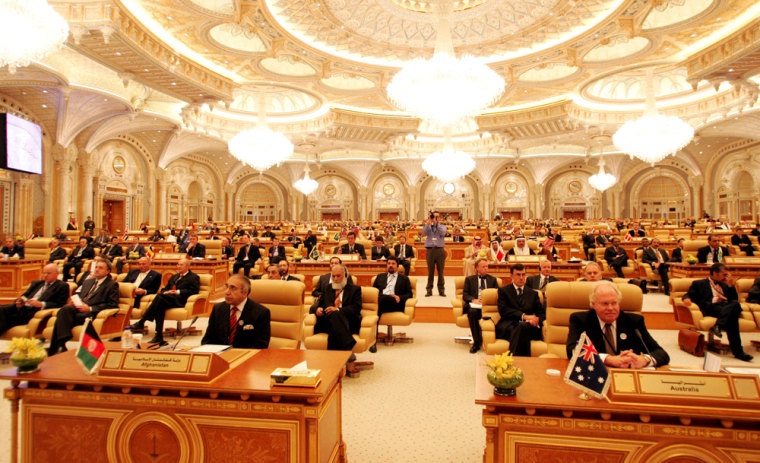Saudi Arabia, battling an al-Qaida campaign, vowed on Saturday to fight terrorism to the end but warned at a world anti-terror forum that the war would be bitter and long.
“I know that terrorism will not go away overnight and our war against terrorism will be long and bitter,” de facto ruler Crown Prince Abdullah told security and intelligence officials from more than 50 countries.
“Terrorism increases in ferocity and violence the more the noose tightens round its neck, but I trust the final result will be victory, tolerance, love and peace,” Abdullah said.
He said the world’s biggest oil exporter was among the first countries to be hit by terror.
Al-Qaida has carried out suicide bombings against Westerners and government targets and its Saudi-born leader Osama bin Laden has also urged his supporters to strike directly against oil facilities in the region.
“We are in a war against terrorism and whoever supports it and justifies it,” Abdullah said.
Abdullah urged all countries to set up an international center to fight terrorism, grouping experts with the aim of exchanging information to try to pre-empt acts of terrorism.
He said Saudi Arabia would share its experience and resources with other countries to fight terror.
The conference takes place less than six weeks after an al-Qaida suicide bomber blew up a car at the gates of Saudi Arabia’s Interior Ministry, the nerve center of its battle against militants.
Extra security in Riyadh, which has been on high alert for nearly two years, was visible across the Saudi capital on Saturday. Security forces manned roadblocks and special forces in black balaclavas guarded delegates.
Working to close the credibility gap
Experts say that while the four day conference provides symbolic evidence of Saudi progress in the fight against terror, the kingdom’s biggest problem is making the rest of the world believe its efforts are genuine.
“When they speak about internal security nobody believes them,” said Kevin Rosser, an analyst with the London-based Control Risks Group. “Even when they have made genuine progress it’s taken a long time for the outside world’s recognition to catch up.”
“There’s a general problem of lack of transparency and an unwillingness to speak frankly about internal problems,” he added. “They have begun to try to address that but ... they haven’t done enough to close the credibility gap.”
During the Feb. 5 through 8 meeting, delegates will discuss the roots of terrorism, the relationship between terrorism and money laundering, narcotics, and arms smuggling and the structure of terrorist organizations. They will also share techniques to fight terrorism.
The conference comes 21 months after Saudi Arabia began a serious crackdown to root out terrorism after militants attacked three residential compounds in Riyadh in May 2003.
Before those attacks, Saudi Arabia considered terrorism a scourge affecting the West. There was a conviction the militants would not risk killing other Saudis or Muslims in strikes inside the kingdom.
Since the 2003 launch of its anti-extremist offensive, 600 people have been arrested. Authorities have recovered weapons caches, false documents and, in some cases, makeup and wigs the militants used to disguise themselves as women.
'Threat is unlikely to disappear'
A report released last month by the Washington-based Center for Strategic and International Studies said despite the successes and decreasing support for al-Qaida in Saudi Arabia, “The terror threat is unlikely to disappear for years to come.”
“Al-Qaida can draw on Saudis in Afghanistan, Pakistan, Yemen, and Central Asia, as well as other members ... who may be able to enter Saudi Arabia,” said the report.
In the last year, the report said, Saudi border guards have detained nearly 1 million people attempting to enter illegally into the kingdom and seized more than 10 tons of drugs and 2,000 weapons. Some 30,000 men were detained in the Yemeni border area in July 2004 alone, the report said. In all, 19,000 smuggling attempts were foiled and 8,000 smugglers arrested, it said.
Rosser said Saudi Arabia should be more open about the precise nature of the threat in the kingdom to help foreign companies manage the risks.
Despite the dangers, predictions that terrorist attacks would drive out foreign workers, especially in key sectors such as oil, have proved false.
The kingdom does not give a breakdown of the nationalities of its foreign workers. Rosser said there has been a decrease in the foreign community but it appears to have come primarily from dependents and some nonessential employees and not from those who actually do the work.
